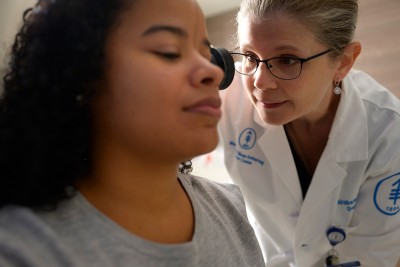
Melanoma is a type of skin cancer that develops most often in fair skin. That may explain the common belief that people of color are at low or no risk for melanoma. In fact, melanoma can develop in any color skin, including black, brown, and olive.
In people of color, melanoma is often diagnosed at a late stage. Some melanomas are easy to miss. When melanoma is diagnosed at a later stage, it’s harder to treat.
Does Sun Exposure Increase Melanoma Risk on Dark or Black Skin?
Melanoma on dark skin is not related to sun exposure. It can start in places that get little sun. That includes the palms of your hands, soles of your feet, nails, and inside your mouth, anal, and genital areas.
How to Check for Melanoma on Dark or Black Skin
It’s important to be familiar with how your skin usually looks. That way you can quickly spot any changes or signs of skin cancer. For more information, please read our guide How to Do a Monthly Skin Exam to Check for Melanoma. You can also watch our video, How to Check Your Skin for Melanoma.
How to Prevent Skin Cancer on Dark or Black Skin
Skin cancer prevention often focuses on exposure to the sun and harmful UV radiation. People of color rarely develop melanoma from UV radiation, because dark skin has melanin that filters the UV.
Common Types of Melanoma in People with Dark or Black Skin
Acral melanoma occurs on the palms of the hands and soles of the feet. It usually is a dark spot, but sometimes it can lack pigment (substance that gives color to skin). It can look red or pink. When it starts under your nail it is called subungual melanoma. It can look like fungus, blood, or a dark stripe.
Mucosal melanoma occurs on the inner lining of the mouth, vagina, or anus. It also usually looks like a dark or black mass but sometimes can lack pigment and look red or pink.
Treatment for Melanoma
Melanoma can be cured with surgery when it’s found early. Most advanced cases need more than one method of treatment, and this can involve immunotherapy or targeted therapies. Our treatment goals are to:
- Cure the cancer.
- Preserve how your skin looks.
- Preserve how your body works and your quality of life.
Learn more about treatment options for people with melanoma.
We’re available 24 hours a day, 7 days a week
